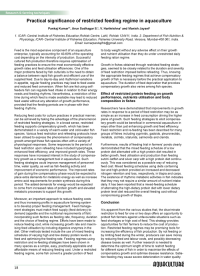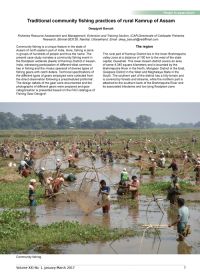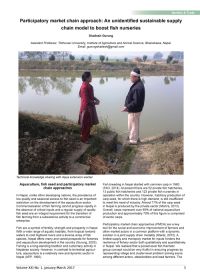Feed is the most expensive component of an aquaculture enterprise. Successful cultured fish production requires optimisation of feeding practices to ensure the most economically effective growth rates. Reducing feed costs for culture practices can be achieved by taking the advantage of restricted feeding strategies. Under a restricted feeding regime fish convert a greater portion of feed to body weight. Case studies of restricted feeding are presented for several species and the costs savings and other benefits are briefly discussed.
Community fishing is a unique feature in the state of Assam, India. The present case study narrates a community fishing event in the floodplain wetlands (beels) of Kamrup District in Assam, India, witnessing participation of different tribal communities in fishing and the modus operandi of diverse types of fishing gears with catch details. The design details of the gear were documented. The communal fishing practices of local communities are described along with the respective roles of men and women.
In Nepal, low quality and seasonal access to fish seed is an important restriction on the development of the aquaculture sector. Commercialisation of fish farming cannot progress rapidly in the absence of critical inputs and a regular supply of quality fish seed is an integral requirement for the transition of fish farming from a subsistence activity to a commercial enterprise. Participatory market chain approaches are a key tool for the social and economic improvement of farmers and market participants.
FAO, NACA and the Thai Department of Fisheries convened a Regional Consultation Responsible Production and Use of Feed and Feed Ingredients for Sustainable Growth of Aquaculture in Asia-Pacific in Bangkok, 7-9 March 2017. The objective of the consultation was to review the current status of aquaculture feed production and use, demand and supply, sourcing of ingredients, government policies and institutional support, ongoing progress and development gaps. The meeting brought together government and private sector representatives.
Due to the recent increase in aquaculture and the rising demand for marine ingredients for use in pelleted feeds, there is concern that aquaculture is contributing to the over-exploitation of fishing stocks. There is a growing need for aquaculture enterprises to be able to demonstrate responsible practices, including the source of any marine ingredients used in the compound feed. Responsible sourcing can be demonstrated by purchashing ingredients that have been approved under the IFFO RS standard.


